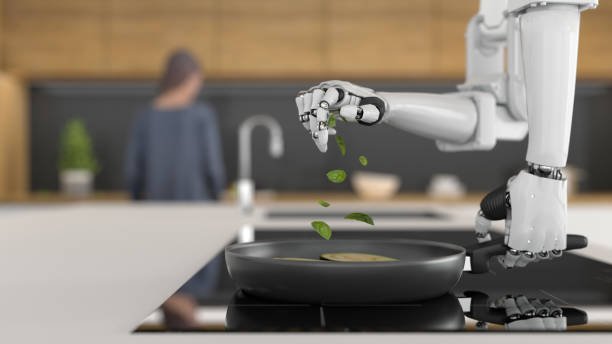Physical Address
60 Ekwema Cres, Layout 460281, Imo
Physical Address
60 Ekwema Cres, Layout 460281, Imo

In recent times, the progress of artificial intelligence (AI robots) has raised concerns about its potential impact on different industries. One such industry incorporating AI is the restaurant sector.
Now, there’s notable news about a Pasadena, California restaurant named “CaliExpress,” which stands out for its robotic kitchen crew. This establishment has become the first in the United States to extensively use AI-powered robots for cooking, marking a significant shift towards automation in the culinary field.
In this piece, we’ll be reviewing this achievement by CaliExpress and how it affects the human workforce.
CaliExpress, is a burger joint in the heart of Pasadena. It’s making culinary history in California by being the first restaurant to employ AI-powered robots as its primary chefs.
Gone are the days of greasy aprons and sizzling hot grills manned by human cooks. Instead, CaliExpress boasts a sleek, futuristic kitchen where robots named “Flippy” and “Grillbot” tirelessly churn out burgers and fries with the precision of a seasoned chef.
Flippy , the star of the show from Miso Robotics is a robotic arm with a built-in camera and AI brain. It flawlessly navigates the fryer, flipping patties, dropping fries, and monitoring temperatures with an accuracy that would make any human cook jealous. Grillbot by Cucina, handles the grilling duties, ensuring a perfect char on every burger.
The use of AI robots in this restaurants is not intended to replace human workers but rather to assist and complement them, allowing them to focus on more intricate and customer-centric aspects of food preparation and service.
Read Also: Instagram Founder Shuts Down Artifact News App Within a Year of Launch
This shift in the culinary world goes beyond just advanced kitchen tools. Vic Aulakh, the owner of CaliExpress, sees it as a solution to the ongoing shortage of kitchen staff and the risks associated with working in a hot, fast-paced environment.
Aulakh highlights the challenge of finding enough people willing to handle tasks like frying and grilling, and he believes these robots not only take on repetitive jobs but also eliminate the dangers of burns and injuries.
The robots, such as Flippy and Grillbot, showcase remarkable efficiency. Flippy can produce 250 pounds of fries per hour, and Grillbot can cook 100 burgers within the same timeframe. This not only leads to quicker service but also reduces operational expenses for the restaurant.
Addressing concerns about taste, Vic asserts that the impact will be positive. The robots ensure consistent cooking for each burger, enhancing quality as they replicate the same precise cooking process every time.
Read Also: Lemfi Wins Tech Product of the Year Award for Making Cross-Border Payments Easy
CaliExpress incorporates robots to handle repetitive tasks, such as assembling burgers, allowing human staff to focus on creative cooking aspects like customizing orders. Aulakh emphasizes that robots are meant to assist, not replace human chefs, maintaining a personal touch in meals.
The introduction of AI chefs has stirred diverse opinions. Some view it as culinary progress with automated efficiency, while others express concerns about potential job losses and a diminished human connection in dining experiences.
CaliExpress is a pioneer in this trend, and other restaurants like White Castle and Jack in the Box are also adopting similar machines. The widespread use of AI chefs in restaurants is uncertain, but the future of food seems headed towards increased robotic involvement.
Read Also: The 10 Best AI Voice Generators in 2024
The AI robots are equipped with advanced algorithms and sensors that enable them to perform various cooking tasks, such as chopping, stirring, and even grilling, based on pre-programmed instructions or real-time commands.
The use of AI robots in the kitchen can enhance efficiency, reduce labor costs, and maintain consistency in food preparation. It also presents an innovative and futuristic approach to culinary operations.
The use of AI robots can lead to quicker service and consistent food quality. It also provides a unique and futuristic dining experience for customers who may find the technology intriguing.
The integration of AI robots in California restaurants to handle kitchen duties marks a groundbreaking leap in culinary innovation. This harmonious fusion of technology and food not only streamlines kitchen operations but also opens up new possibilities for creativity and efficiency.